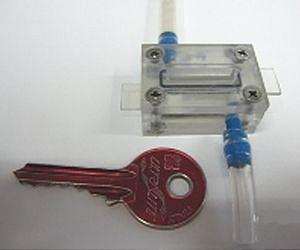From man-made toxic chemicals such as industrial by-products to poisons that occur naturally, a water or food supply can be easily contaminated. And for every level of toxic material ingested, there is some level of bodily response, ranging from minor illness to painful certain death. Biosensors have long been used to safeguard against exposure to toxic chemicals.
Food tasters employed by the ancients acted as early versions of biosensors, determining if a meal had been poisoned. More modern examples include the use of fish, which may alter their swimming characteristics if a toxic material is introduced into to the water.
But although current warning systems are more sophisticated, they require equipment and time that a soldier in the field or an adventurer in the wilderness do not have.
Now Prof. Yosi Shacham-Diamand, Vice Dean of Tel Aviv University’s Faculty of Engineering, along with Prof. Shimshon Belkin of the Institute of Life Sciences at the Hebrew University of Jerusalem, has married biology and engineering to produce a biosensor device called the “Dip Chip,” which detects toxicity quickly and accurately, generating low false positive and false negative readings.
The Dip Chip contains microbes designed to exhibit a biological reaction to toxic chemicals, emulating the biological responses of humans or animals.
Converting biological response to electricity
The biological reaction is converted into an electronic signal that can be read by the user. When perfected for commercial applications, the chip might be easily plugged into a mobile device to determine toxicity, says Prof. Shacham-Diamand.
The new chips are based on genetically modified microbes developed in Prof. Belkin’s lab. When the modified microbes are exposed to toxic or poisonous materials, they produce a measurable biochemical reaction – and this is where Prof. Shacham-Diamand’s work begins.
“In my lab, we developed a method for communicating with the microbes, converting this biological response to electrical signals,” he explains. The device, which looks like a dip stick, immobilizes these specially-produced microbes next to the sensing electrodes.
Once the microbes come into contact with a questionable substance they produce a chemical signal that is converted to an electrical current by an device that can interpret the signals, producing a binary “toxic” or “not toxic” diagnosis.
In the future, Prof. Shacham-Diamand hopes that smaller versions of the Dip Chips might be plugged into existing mobile electronic devices, such as cell phones or tablets, to give the user a toxicity reading. This would make it an economically feasible and easy-to-use technology for people such as campers or for military purposes.
Reading any toxic material
One of the chip’s advantages is its ability to identify toxicity as a biological quality instead of specific toxic chemicals. There are already excellent detectors to identify specific toxic materials, says Prof. Shacham-Diamand.
The Dip Chip, however, is designed to alert the user to overall toxicity. And because the chip measures general toxicity, it will pick up on any and all toxic materials – even those that have not been discovered or invented yet.
Beyond their ability to find toxic chemicals in the field, these chips can also be put to use in the cosmetics or pharmaceuticals industries, says Prof. Shacham-Diamand.
They could be used to detect the toxicity of new compounds, minimizing the controversial use of lab animals. Using the same technology, the researchers have also developed a larger-scale device which allows water to flow continuously over the sensor, making it appropriate for online, real-time monitoring of water supplies.
The results of their research have been published in a number of journals, including Electrochimica Acta and Sensors and Actuators B: Chemical.
Source: American Friends of Tel Aviv University











